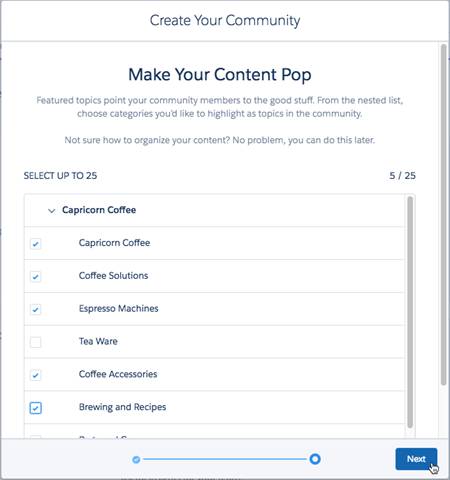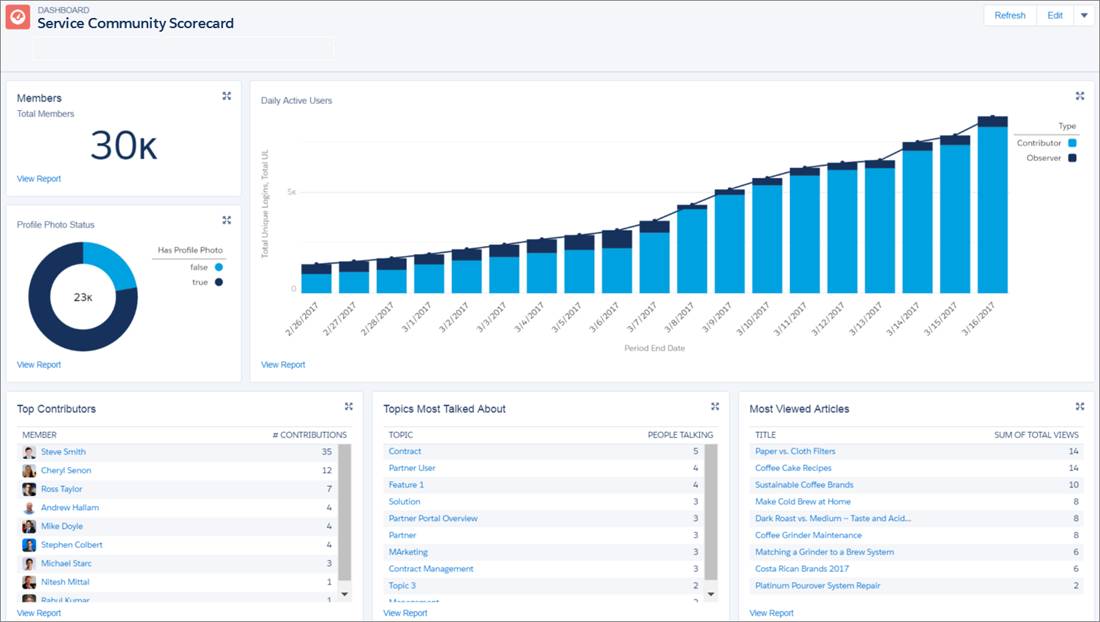Engage with Your Customers
Learning Objectives
Use Experience Cloud to Engage with Customers
You’re interested in creating an Experience Cloud site for your customers. Why? Because a service portal for customers:
- Gives customers one place to find information about your company and products
- Provides customers access to their data (accounts, service tickets, bills, and so on)
- Lets customers share experiences and expertise with other customers
Let’s look at a self-service portal in action.
Lira Financial is a software company based in Boulder, Colorado, that makes cloud-based accounting software for both individuals and businesses. Around 25,000 customers worldwide use Lira’s products.
Individual clients use Lira to create budgets, track bills, and do their taxes. Business clients use Lira to calculate sales tax, do online accounting, manage their payrolls, and more. Sarayu Jain, the head of IT, has been looking to upgrade the company’s internal- and external-facing digital experiences. She’s chosen Salesforce and Experience Cloud to meet her goals. With Experience Cloud, Lira Financial can create multiple experiences in its Salesforce org, so Lira can tailor them to individual and business customers.
Jasper Hare, the company’s VP of Support, wants individual and business customers to have their own specific site for their needs. Within Lira’s site, the customer can maintain their account, view knowledge articles, and if need be, open cases with support.
Jasper works with Sarayu and Alessandra Pesola, the site manager, to come up with specific goals for Lira’s customer experience. As the three of them brainstorm, they realize that there’s a different list of goals for each type of customer. They actually need two distinct experiences: a customer site for individual clients, and a customer account portal for business clients. Luckily, Experience Cloud makes that easy.
| Lira’s Individual Client Customer Support Site | Lira’s Business Client Customer Support Site |
|---|---|
|
|
Giving Customers What They Need
We’ve already mentioned one of the biggest benefits of building your experience on the Salesforce Platform: the fact that you’re actually building on the Salesforce Platform. Being on the Salesforce Platform means that you can integrate various Salesforce features seamlessly into your experience.
Let’s see how a few Service Cloud features can enhance Lira Financial’s customer service offerings.
First, Lira can now easily expose its Salesforce Knowledge articles outside its internal org. A few clicks in Experience Builder are all it takes for customers to access helpful articles about Lira products and support. What if customers don’t find what they need in an article? They can easily ask a question or file a case directly from the site.

All the cases filed in Lira’s self-service site show up in Salesforce—which means they can be tracked and reported on. How’s this reporting helpful? Well, every year, just before U.S. taxes are due, Lira sees a significant increase in cases about calculating deductions. Based on this increase, Lira’s product teams decide to publish a video showing how customers can calculate their deductions, and where to enter that information. The number of cases about deductions drops.
Lira Financial then decides to add live chat capabilities to its experiences with the Chat component in Experience Builder. When client Veronica Sigismondo has a problem, she just clicks the popup that offers help. Veronica starts chatting with a Lira support agent, James McGuire.
On his end, James is using the Service Console where he sees Veronica’s information in one glance. James notices that Veronica has been a Lira business customer for 6 years, and in that time she’s opened three cases. All her cases have to do with calculating sales tax for her specialty knit hats.
James helps Veronica resolve the case quickly (her company has to ship goods to Oregon, which doesn’t have a state sales tax). At the same time, he offers her a deal on a new Lira sales tax wizard, which takes the guesswork out of a complicated process. Veronica doesn’t commit to buying, but James can tell that she’s thinking about it. James enters a note in her account for the sales team to follow up with Veronica, to see if her interest amounts to a new sale.
Measure the Return on Your Experience Cloud Investment
How can Sarayu know if Lira’s investment in Experience Cloud is worth the time and money the company plans to invest? She decides to meet again with Jasper and Alessandra to understand how they want to measure success. As the guy who manages customer relations, Jasper is keen on keeping both individual and business clients happy.
He’s looking at the following numbers, gathered before and after the implementation of the self-service sites.
- Number of deflected cases
- Time spent by a support agent on each case
- Customer satisfaction
- Net promoter score (NPS)
When all these numbers come together, the Lira services team can look at overall trends. Are there fewer support cases? Are support costs decreasing? After a few months, Sarayu, Jasper, and Alessandra reconvene and discover that both the individual customer site and business client portals are having an amazing impact. No one is surprised, but everyone is delighted.

Sarayu is happy because she’s using one system to connect her business processes to external customers.
Jasper is thrilled because the cost of closing a case decreased from $55 for a phone case to less than 50 cents for an online interaction.
And Alessandra is pleased that group engagement levels are increasing at a steady clip, and folks are helping each other out with difficult questions.